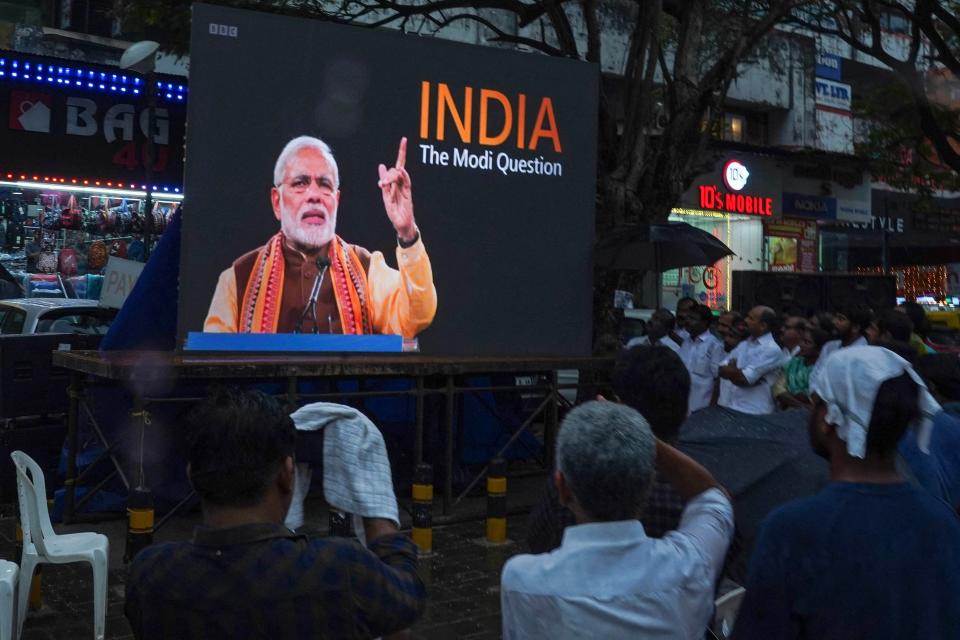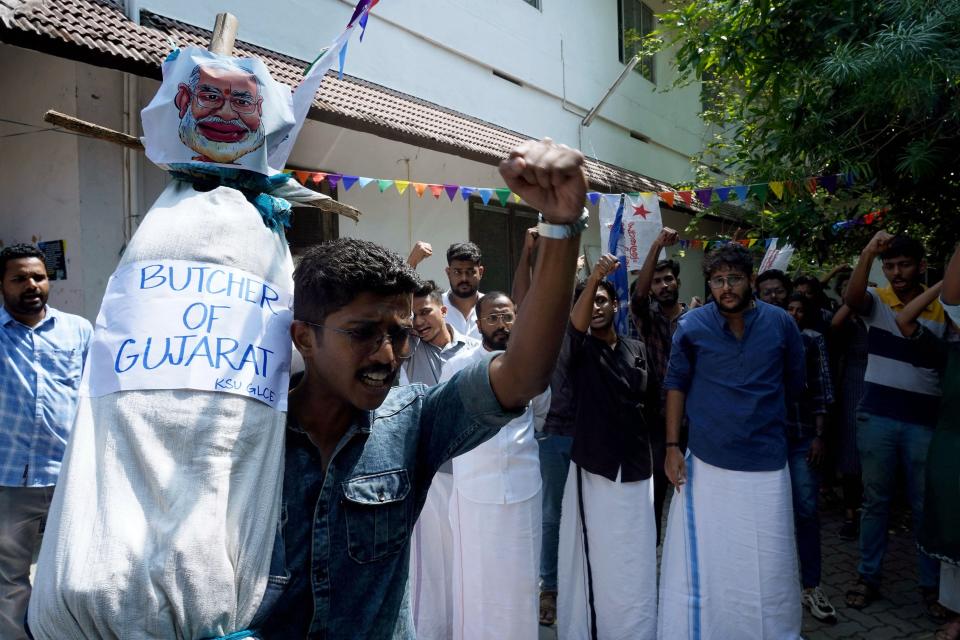Why are YouTube and Twitter helping India block a damning documentary against its leader?
- Oops!Something went wrong.Please try again later.
- Oops!Something went wrong.Please try again later.
When the big screen blacked out, young people whipped out their phones and continued watching online. College students in India have been screening the BBC documentary “India: The Modi Question” after the Indian government blocked it.
And now India's Supreme Court is considering legal petitions against the ban.
The furor only elevated the film’s question: How complicit the Indian prime minister was in a pogrom against Muslim citizens two decades ago. Whether Indians in the diaspora agree with the answer, we should also see how each one of us is associated with violence against minorities, simply by having lived through such events.
India orders YouTube, Twitter to block BBC documentary on Modi
YouTube and Twitter India have removed links to the documentary at the Modi government’s orders. For vocal Indian users of Twitter, that’s a far cry from owner Elon Musk claiming that he'd make it a free speech platform for democracy.
Can we just be honest?: It's time to ghost social media and the billionaires who run it
Don't quit Twitter over Musk: Fight for democracy
Pirated versions are now online, but watching the first episode of the two-part film on the Internet Archive before it was taken down brought back clear memories of my own experience of violence between religious communities when I was a teenager growing up in Uttar Pradesh, a state in India’s northern plains and part of India’s “Hindu heartland.”
I was working in the United States when riots broke out in 2002 in the western state of Gujarat, but reports circulated about the state’s complicity in a backlash against Muslims after the burning of a train compartment carrying Hindu pilgrims. Rioters roamed the streets for days, raping, looting and killing fellow citizens, even children.

Indian Prime Minister Narendra Modi was, at the time, chief minister of Gujarat and a rising star in Indian politics.
In one scene in the documentary, a survivor of the riot describes how Modi’s office rejected calls for help from a Muslim member of Parliament who was sheltering some families. The M.P. then offered himself to the mob, begging it to spare the others. The mob slit his throat, said the survivor who managed to get away, and then they attacked the women, men and children hiding in the building.
The Supreme Court has since dismissed charges filed by the M.P.’s widow on Modi’s role in the riots.
'Egregious violations of religious freedoms'
The Indian government has called the BBC documentary “propaganda” reeking of a “colonial mind-set,” as if the Gujarat pogrom were less heinous when the Indian news media reported it. And the Indian media appears to have mostly forgotten its own reporting by focusing on the ban, not the film’s burning question.
A U.S. State Department spokesperson told a reporter he "was not familiar” with the film, even as it made international headlines. Yet in December, the U.S. Commission on International Religious Freedom criticized the State Department for ignoring its recommendation to put India as a country of particular concern for “egregious violations of religious freedoms.”
Opinions in your inbox: Get exclusive access to our columnists and the best of our columns throughout the week
But what about the Indian people?
Ask me, for instance. I grew up in India in the 1980s and '90s.
What I witnessed of religious hate
Hindu-Muslim tensions caused the carnage of partition in 1947, when modern-day India and Pakistan were created by redrawing borders. But politicians stoked that sentiment in front of my own eyes when I was in school.
In 1990, Lal Krishna Advani, an Indian politician who adopted a Hindu nationalist platform announced a “journey by chariot” to the site of a mosque built by Muslim conquerors allegedly over an ancient temple they destroyed in one of Hindus’ holiest cities, Ayodhya. The “journey” signaled to the nation that revenge was in order, blessed by a leading political party. And revenge was had. It was had when thousands of young men followed Advani’s call and demolished the mosque.
It was had when riots broke out in many cities, including my home city of Kanpur.
At night, my brother and I listened for distant sirens in the poorer neighborhoods near us where Muslims and Hindus lived in close proximity to each other. One woman told me she kept chili powder handy to fling at Muslim rioters.
My mother’s Hindu dry cleaner broke down as he told us about the stabbing death of the tailor who worked with him, an elegant, old Muslim man who rode a bicycle and always wore a skull cap and a white shalwar-kurta. “Masterji,” or the master, an affectionate term for craftsmen, was riding home from work one night when a rioter stabbed him.
The day before he was killed, the same old tailor had gently scolded my mother for visiting the store with us, her two children, instead of staying home where we were safe.
Islam's holiest month: As a Muslim, I'm reflecting on loss and grief during Ramadan
Sikh American: My mother was killed by a white supremacist. Now we need advocacy, not sympathy.
Five years prior, Sikhs, another minority, became the target of violence after Prime Minister Indira Gandhi was shot dead by her Sikh bodyguards in Delhi in 1984. Schools closed and curfew was imposed. My father came home from work one night, despondent. A Sikh factory employee was dragged out of his house with his family and lynched.
Revenge was had when a Hindu strongman interrupted my high school class and made us repeat a religious chant after him. I mouthed the words, imagining the fear in the heart of my one Muslim classmate, whom I dared not look at.
73rd anniversary of India Constitution
What changed in the three decades since the demolishing of the mosque? A growing culture of impunity that leaves minorities feeling more threatened than ever before in the country’s collective memory. This, in one of the most ethnically and religiously diverse nations where communities have coexisted peacefully before present-day politicians began to exploit this diversity.
In a 2020 Pew Research Center study of India, 84% said religious tolerance is central to being “truly Indian.”

The Modi government’s tactics against Muslims in particular feed an idea that modern India needs to create an exclusive Hindu identity. Revenge is being had.
As upper-middle class Christians, my family was generally safe from sectarian strife, but the fragile peace that existed between minority communities and the Hindu majority was like a match waiting to be lit, and it made me uncomfortably aware of the precariousness of being on the other side. In school then and among my friends, almost all of whom were also Hindus, there never was a question that the murders of Muslims and Sikhs was horribly wrong.
Opinion alerts: Get columns from your favorite columnists + expert analysis on top issues, delivered straight to your device through the USA TODAY app. Don't have the app? Download it for free from your app store.
However, I also knew people who would not condemn it, so the violence – by nameless, faceless mobs – was even more sinister for being commonplace and something to be expected.
'The Forgotten Army' of WWII: D-Day spurs remembrance of 2.5M vital Allied Indian soldiers
Just last month on Republic Day, India celebrated 73 years of its constitution, which enshrines the rights to freedom of speech and freedom of conscience to practice religion. Now, those very rights are in peril.
By banning a documentary in the world’s largest democracy with 1.4 billion people, the Indian government has acknowledged this.
Mary Ann Koruth is a staff writer for The Bergen Record and northjersey.com, part of the USA TODAY Network. Follow her on Twitter: @MaryAnnKoruth
You can read diverse opinions from our Board of Contributors and other writers on the Opinion front page, on Twitter @usatodayopinion and in our daily Opinion newsletter. To respond to a column, submit a comment to letters@usatoday.com.
This article originally appeared on USA TODAY: YouTube, Twitter blocking 'India: The Modi Question' damns democracy

